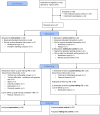The influence of computer-based cognitive flexibility training on subjective cognitive well-being after stroke: A multi-center randomized controlled trial
- PMID: 29145410
- PMCID: PMC5690615
- DOI: 10.1371/journal.pone.0187582
The influence of computer-based cognitive flexibility training on subjective cognitive well-being after stroke: A multi-center randomized controlled trial
Abstract
Background: Stroke can result in cognitive complaints that can have a large impact on quality of life long after its occurrence. A number of computer-based training programs have been developed with the aim to improve cognitive functioning. Most studies investigating their efficacy used only objective outcome measures, whereas a reduction of subjective cognitive complaints may be equally important for improving quality of life. A few studies used subjective outcome measures but were inconclusive, partly due to methodological shortcomings such as lack of proper active and passive control groups.
Objective: The aim of the current study was to investigate whether computer-based cognitive flexibility training can improve subjective cognitive functioning and quality of life after stroke.
Methods: We performed a randomized controlled double blind trial (RCT). Adults (30-80 years old) who had a stroke 3 months to 5 years ago, were randomly assigned to either an intervention group (n = 38), an active control group (i.e., mock training; n = 35), or a waiting list control group (n = 24). The intervention and mock training consisted of 58 half-hour sessions within 12 weeks. The primary subjective outcome measures were cognitive functioning (Cognitive Failure Questionnaire), executive functioning (Dysexecutive Functioning Questionnaire), quality of life (Short Form Health Survey), instrumental activities of daily living (IADL; Lawton & Brody IADL scale), and participation in society (Utrecht Scale for Evaluation of Rehabilitation-Participation). Secondary subjective outcome measures were recovery after stroke, depressive symptoms (Hospital Anxiety Depression Scale-depression subscale), fatigue (Checklist Individual Strength-Fatigue subscale), and subjective cognitive improvement (exit list). Finally, a proxy of the participant rated the training effects in subjective cognitive functioning, subjective executive functioning, and IADL.
Results and conclusions: All groups improved on the two measures of subjective cognitive functioning and subjective executive functioning, but not on the other measures. These cognitive and executive improvements remained stable 4 weeks after training completion. However, the intervention group did not improve more than the two control groups. This suggests that improvement was due to training-unspecific effects. The proxies did not report any improvements. We, therefore, conclude that the computer-based cognitive flexibility training did not improve subjective cognitive functioning or quality of life after stroke.
Conflict of interest statement
Figures


Similar articles
-
Brain training improves recovery after stroke but waiting list improves equally: A multicenter randomized controlled trial of a computer-based cognitive flexibility training.PLoS One. 2017 Mar 3;12(3):e0172993. doi: 10.1371/journal.pone.0172993. eCollection 2017. PLoS One. 2017. PMID: 28257436 Free PMC article. Clinical Trial.
-
The effect of computer-based cognitive flexibility training on recovery of executive function after stroke: rationale, design and methods of the TAPASS study.BMC Neurol. 2015 Aug 20;15:144. doi: 10.1186/s12883-015-0397-y. BMC Neurol. 2015. PMID: 26286548 Free PMC article. Clinical Trial.
-
Virtual reality gait training versus non-virtual reality gait training for improving participation in subacute stroke survivors: study protocol of the ViRTAS randomized controlled trial.Trials. 2019 Jan 29;20(1):89. doi: 10.1186/s13063-018-3165-7. Trials. 2019. PMID: 30696491 Free PMC article.
-
Occurrence and measurement of transfer in cognitive rehabilitation: A critical review.J Rehabil Med. 2007 Jul;39(6):425-39. doi: 10.2340/16501977-0092. J Rehabil Med. 2007. PMID: 17624476 Review.
-
Effectiveness of computer-based training on post-stroke cognitive rehabilitation: A systematic review and meta-analysis.Neuropsychol Rehabil. 2022 Apr;32(3):481-497. doi: 10.1080/09602011.2020.1831555. Epub 2020 Oct 23. Neuropsychol Rehabil. 2022. PMID: 33092475
Cited by
-
Systematic review on post-stroke computerized cognitive training: Unveiling the impact of confounding factors.Front Psychol. 2022 Dec 12;13:985438. doi: 10.3389/fpsyg.2022.985438. eCollection 2022. Front Psychol. 2022. PMID: 36578681 Free PMC article.
-
Artificial Cognitive Systems Applied in Executive Function Stimulation and Rehabilitation Programs: A Systematic Review.Arab J Sci Eng. 2023;48(2):2399-2427. doi: 10.1007/s13369-022-07292-5. Epub 2022 Sep 28. Arab J Sci Eng. 2023. PMID: 36185593 Free PMC article.
-
Intervention patterns and preliminary effectiveness on Social Participation following stroke: a scoping review.BMC Neurol. 2023 Jul 18;23(1):275. doi: 10.1186/s12883-023-03250-2. BMC Neurol. 2023. PMID: 37464300 Free PMC article.
-
Intervention and assessment of executive dysfunction in patients with stroke: A scoping review.PLoS One. 2024 Feb 6;19(2):e0298000. doi: 10.1371/journal.pone.0298000. eCollection 2024. PLoS One. 2024. PMID: 38319926 Free PMC article.
-
Strengthening Mental Abilities with Relational Training (SMART) in multiple sclerosis (MS): study protocol for a feasibility randomised controlled trial.Pilot Feasibility Stud. 2022 Sep 3;8(1):195. doi: 10.1186/s40814-022-01152-7. Pilot Feasibility Stud. 2022. PMID: 36056385 Free PMC article.
References
-
- van Rijsbergen MWA, Mark RE, de Kort PLM, Sitskoorn MM. Prevalence and profile of poststroke subjective cognitive complaints. Journal of Stroke & Cerebrovascular Diseases. 2015;24: 1823–1831. - PubMed
-
- Wilz G. Predictors of subjective impairment after stroke: Influence of depression, gender and severity of stroke. Brain Injury. 2007;21: 39–45. doi: 10.1080/02699050601121996 - DOI - PubMed
-
- Fride Y, Adamit T, Maeir A, Ben Assayag E, Bornstein NM, Korczyn AD, et al. What are the correlates of cognition and participation to return to work after first ever mild stroke? Topics in Stroke Rehabilitation. 2015;22: 317–325. doi: 10.1179/1074935714Z.0000000013 - DOI - PubMed
-
- Kielbergerova L, Mayer O Jr, Vanek J, Bruthans J, Wohlfahrt P, Cifkova R. Quality of life predictors in chronic stable post-stroke patients and prognostic value of SF-36 score as a mortality surrogate. Transl Stroke Res. 2015;6: 375–383. doi: 10.1007/s12975-015-0418-6 - DOI - PubMed
-
- van Rijsbergen MWA, Mark RE, de Kort PLM, Sitskoorn MM. Subjective cognitive complaints after stroke: A systematic review. Journal of Stroke & Cerebrovascular Diseases. 2014;23: 408–420. - PubMed
Publication types
MeSH terms
LinkOut - more resources
Full Text Sources
Other Literature Sources
Medical

